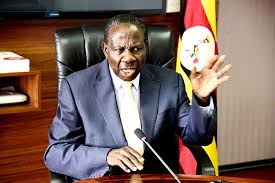In abid to address donor funding shortfall, Finance Minister Matia Kasaija has released Uganda’s comprehensive strategy to enhance domestic revenue mobilization totaling to $9.6 billion for the fiscal year 2025/26.
According to Kasaijja this collection target is expected to finance about 60% of the national budget, reducing reliance on external funding.
Presenting the budget at Kololo the Minister underscored a multifaceted approach focused on broadening the tax base that includes strategic government investments in key sectors identified for their growth potential, such as agro-industry, tourism, minerals, and the burgeoning oil and gas sector.
According to Kasaia attention will be directed towards science, technology, and innovation, alongside robust support for small and medium enterprises, all intended to stimulate economic activity and, consequently, tax receipts.
Kasaija emphasized the government’s commitment to penalizing both corrupt tax officers and non-compliant taxpayers. He also mentioned enhancement of tax compliance as another pillar of the plan.
“The government will reinforce the implementation of established digital tools, including the Electronic Fiscal Receipting and Invoicing Solution (EFRIS), digital tax stamps, and specialized rental tax solutions,” Matia said.
To curb revenue leakages from illegal trade, intensified efforts against smuggling are planned. This involves deploying advanced surveillance technologies such as scanners, drones, and tracking systems at border points. These technological deployments will be complemented by increased patrols in areas identified as high-risk for illicit cross-border activities.
The strategy further includes a rationalization of tax exemptions, with a specific focus on those that align with industrial policy objectives. These exemptions will now incorporate sunset clauses, ensuring they are time-bound and regularly reviewed for effectiveness and relevance. Legal frameworks are also slated for amendments to address existing loopholes that contribute to revenue leakage and to provide greater clarity for taxpayers, thereby fostering voluntary compliance.
To support these initiatives, the Uganda Revenue Authority will undergo strengthening measures, including the recruitment and comprehensive training of additional tax officers. These personnel will be equipped with the necessary skills and resources to enhance tax collection efficiency. Additionally, the central government will provide crucial support to local governments and various revenue-generating public entities, empowering them to improve their own collection capabilities.
New tax policy measures, already approved by Parliament, are projected to generate an additional 538.6 billion Ugandan shillings (about $139 million USD). These measures include technical amendments aimed at improving the clarity, consistency, and overall fairness of tax laws. Such revisions are anticipated to streamline tax administration, further encourage voluntary compliance among taxpayers, and bolster the operational effectiveness of the URA.

